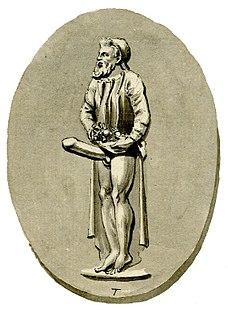
Priap
Strange is the fate of this little god named Priapus, whom ancient and modern authors did not cease to confuse with other figures of sexuality, with Pan or satyrs, but also with his father Dionysus or with Hermaphrodite.... This is undoubtedly due to the fact that the inherent feature of Priapus is a disproportionate male member, and with the fact that we often tend to identify with this ityphallic god (with an erect sex), with everything that was hypersexual. As if the oversexuality of God has confused the learned mythographers. Thus, to define this, Diodorus of Siculus and Strabo talk about the "similarity" of Priapus to other Greek ityphallic gods and claim that they, similar to him, are Priapic (for references to ancient texts and bibliography, see the article "Priapus". [ Maurice Olender], directed by J. Bonnefoy, Dictionary of mythologies .
However, despite these frequent misunderstandings, ancient sources trace the specific figure of this junior deity : indeed, unlike his phallic companions - Pan or satyrs - Priapus is quite human. He has no horns, no animal paws, no tail. His only anomaly, his only pathology, is the huge sex that defines him from the moment of his birth. Fragments of myths tell how newborn Priapus was rejected by his mother Aphrodite precisely because of his ugliness and disproportionate male member. This gesture of Aphrodite, the Roman altar in Aquileia, still testifies to this, where we see a beautiful goddess turning away from the cradle of a child, whom the texts are called amorphous - ugly and deformed.
And this is his congenital flaw, which will also become a sign of the entire mythical curriculum of Priapus - a career the first mention of which refers to the emergence of a god at the dawn of the Hellenistic era, about 300 years before JC, in Alexandria. It was at this time that we find in the epigrams Greek anthology Priapus camped in an orchard - a vegetable garden or orchard - still standing, and whose manly limb is a tool that should distract thieves by frightening them. Of this aggressive sex, Priapus continues to brag about him, holding up a robe full of fruit, clear signs of fertility that he must promote. And to the obscene gesture, the god then joins the word, threatening a possible thief or thief,
But on the meager crops that God must look after, little or nothing grows. And like the wretched gardens of Priapus, the statue of the latter is carved from a mediocre fig tree. Thus, this god, whom the classical tradition presents as an instrument of fertility, texts often make him a figure of a failure. And his cock then appears as a tool as aggressive as it is ineffective, phallus, which produces neither fertility nor even fruitless joy.
It is Ovid who tells how this god fails to take care of the beautiful Lotis or Vesta, and how he ends up empty-handed every time, his gender is in the air, an object of ridicule in the eyes of the congregation, which is obscene. Priapus is forced to flee, his heart and limbs are heavy. And in the Latin priapeas, poems dedicated to him, we find the ityphallic Priapus defending gardens and threatening thieves or thieves from the worst sexual violence. But here he is in despair. Then he begs the villains to cross the fence on which he stands in order to punish them to make his life easier. But the mocking portrayal of the excesses of Priapus will not be able to calm down.
Perhaps it is Dr. Hippocrates in his nosography that best illustrates some aspects of this impotent phallocrate. Because they decided to call "priapism" an incurable disease in which the male sex remains painfully erect over and over again. And these ancient doctors also insist on one point: should not be confused, as they say, priapism с satiriasis , a comparable disease in which an abnormal erection does not exclude either ejaculation or pleasure.
This difference between itifallism of Priapus and satyrs may indicate another division: that which Priapus classifies, whose representations are always anthropomorphic, is on the side of humans, while satyrs, hybrid creatures where man mixes with beasts, are on the side of the demons of savagery. ... As if the disproportionate sexuality, impossible for man - Priapus - was suitable for animals and demi-humans.
Aristotle in his biological writings indicates that nature has endowed the male penis with the ability to be erect or not, and that "if this organ was always in the same state, it would cause discomfort." This is the case with Priapus, who, being always ityphallic, never experiences the slightest sexual relaxation.
It remains to understand the functional aspects of Priapus's ugliness. And how his compulsive gesture continues to be part of a process in which excess leads to failure; how also Priapus fits into this ancient fertile universe in which he was a commonplace figure. The Christian Middle Ages retained its memory for a long time before the Renaissance rediscovered this little god of gardens.
Leave a Reply